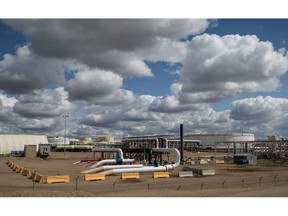
Article content
(Bloomberg) — The Canadian government has signaled it plans to eventually lift the controversial cap on emissions from the oil and gas sector, doubling down instead on its industrial carbon pricing system to rein in pollution.
THIS CONTENT IS RESERVED FOR SUBSCRIBERS ONLY
Subscribe now to read the latest news in your city and across Canada.
- Exclusive articles from Barbara Shecter, Joe O'Connor, Gabriel Friedman, and others.
- Daily content from Financial Times, the world's leading global business publication.
- Unlimited online access to read articles from Financial Post, National Post and 15 news sites across Canada with one account.
- National Post ePaper, an electronic replica of the print edition to view on any device, share and comment on.
- Daily puzzles, including the New York Times Crossword.
SUBSCRIBE TO UNLOCK MORE ARTICLES
Subscribe now to read the latest news in your city and across Canada.
- Exclusive articles from Barbara Shecter, Joe O'Connor, Gabriel Friedman and others.
- Daily content from Financial Times, the world's leading global business publication.
- Unlimited online access to read articles from Financial Post, National Post and 15 news sites across Canada with one account.
- National Post ePaper, an electronic replica of the print edition to view on any device, share and comment on.
- Daily puzzles, including the New York Times Crossword.
REGISTER / SIGN IN TO UNLOCK MORE ARTICLES
Create an account or sign in to continue with your reading experience.
- Access articles from across Canada with one account.
- Share your thoughts and join the conversation in the comments.
- Enjoy additional articles per month.
- Get email updates from your favourite authors.
THIS ARTICLE IS FREE TO READ REGISTER TO UNLOCK.
Create an account or sign in to continue with your reading experience.
- Access articles from across Canada with one account
- Share your thoughts and join the conversation in the comments
- Enjoy additional articles per month
- Get email updates from your favourite authors
Sign In or Create an Account
or
Article content
In its first federal budget on Tuesday, Prime Minister Mark Carney’s government unveiled its climate competitiveness strategy, which lays out how Canada plans to change its approach to environmental regulations and greenhouse gas emissions.
Article content
Article content
Article content
The strategy underscores how Carney has diverged from former Prime Minister Justin Trudeau’s climate policies, which mapped out short-term emission reduction targets it planned to reach through a slate of regulations.
Article content
By signing up you consent to receive the above newsletter from Postmedia Network Inc.
Article content
The Carney government appears to be shifting its focus to the long-term goal of reaching net zero by 2050, saying in its budget that the strategy aims to drive “investment, not prohibitions,” and “results, not objectives.”
Article content
The change in climate policy comes against the backdrop of the US moving away from the Biden-era clean energy agenda and President Donald Trump’s tariffs crippling some Canadian sectors.
Article content
The Canadian government argues it can still reach net zero by 2050 through a revamped industrial carbon pricing system and other measures.
Article content
“Effective carbon markets, enhanced oil and gas methane regulations, and the deployment at scale of technologies such as carbon capture and storage would create the circumstances whereby the oil and gas emissions cap would no longer be required as it would have marginal value in reducing emissions,” the budget said.
Article content
Article content
Finance Minister Francois-Philippe Champagne, speaking to reporters in a news conference, wouldn’t provide a timeline for when he expects the emissions cap to be dropped.
Article content
The signal on the emissions cap will be well-received by the energy sector and Canada’s western provinces, which have lobbied aggressively against the policy, saying it singles out oil and gas companies.
Article content
The budget promises to develop a post-2030 carbon pricing trajectory. It also said it plans to improve its enforcement of the federal carbon price backstop and work with provinces to harmonize or link carbon markets between jurisdictions.
Article content
Colin Busby, a director of policy engagement at the C.D. Howe Institute, applauded the federal government’s intention to ditch the emissions cap in favor of industrial carbon pricing. However, he noted the government may come under pressure to provide carve-outs for high-emission industries hit by tariffs, such as steel and aluminum.
Article content
“Once you get into this area of carve-outs, then the real value of having a nice harmonized consistent price starts to fall apart,” Busby said in an interview.

.jpg) 2 hours ago
2
2 hours ago
2
 English (US)
English (US)